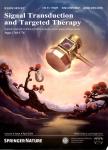Pharmacologic RNA splicing modulation: a novel mechanism to enhance neoantigen-directed anti-tumor immunity and immunotherapy response
作者机构:Department of Medical Biochemistry and Cell BiologyInstitute of BiomedicineSahlgrenska Academy at University of GothenburgGothenburgSweden Sahlgrenska Cancer CenterDepartment of SurgeryInstitute of Clinical SciencesUniversity of Gothenburg and Sahlgrenska University HospitalGothenburgSweden Harry Perkins Institute of Medical ResearchUniversity of Western AustraliaPerthWAAustralia Department of Human Structure and RepairAnatomy and Embryology UnitGhent UniversityGhentBelgium
出 版 物:《Signal Transduction and Targeted Therapy》 (信号转导与靶向治疗(英文))
年 卷 期:2021年第6卷第11期
页 面:3167-3168页
核心收录:
学科分类:1002[医学-临床医学] 100214[医学-肿瘤学] 10[医学]
基 金:Open access funding provided by University of Gothenburg
主 题:immunity immunotherapy mostly
摘 要:A recent study by Lu et al.1 suggests a novel approach to increasing responsiveness to immune checkpoint blockade (ICB) therapy. ICB is a promising form of cancer immunotherapy that aims to boost the anti-tumoral immune response. This response is primarily driven by the presentation of different types of antigens at the cancer cell membrane via the type I major histocompatibility complex (MHC I). Neoantigens are tumor-specific antigens that are small (mostly 9-mers) mutated peptides that generally result from somatic mutations. High tumor mutational burden, which results in the formation of many neoantigens, is currently one of the main biomarkers for ICB response prediction. Because ICB is only effective in a minority of patients, new therapeutic strategies are required to augment this response.



